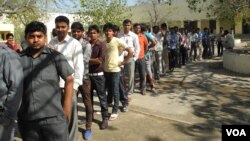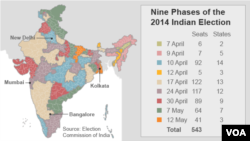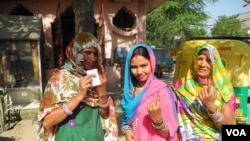NEW DELHI —
India’s electoral battle has moved to the country's heartland, which will play a critical role in deciding the political fortunes of the ruling Congress Party, its main rival, the Bharatiya Janata Party as well as a political newcomer called the Aam Aadmi Party.
Spread over 14 states and territories and covering some 110 million voters, Thursday’s vote was the first big round: it will decide the fate of 91 parliamentary seats.
But nowhere was it as crucial as in the populous Uttar Pradesh (U.P.), where ballots were cast in the west. The north Indian state sends 80 lawmakers to the 543-member house and is famously known as the route to power in the Indian capital.
The Bharatiya Janata Party, which is leading a blitz campaign to unseat the ruling Congress Party, is banking on a good performance in U.P.
“They [BJP] did not do too well in the last election, and they must improve their numbers here if they want to get a commanding position," noted B.G. Verghese, a political commentator with New Delhi’s independent Center for Policy Research. " If they fail here for whatever reason, that will be a severe blow because there won’t be too many other places where they can make good these numbers.”
While development and jobs have emerged as key campaign issues, in some places, such as Muzaffarnagar, factors such as religion also play a critical role.
Indian soldiers killed in Bihar
Voting has been largely peaceful. But on Thursday, hours before polls opened in the eastern state of Bihar, suspected Maoist rebels blew up a jeep, killing at least two paramilitary soldiers and wounding at least three.
Authorities said a jeep carrying the soldiers to a polling station drove over a landmine in the Munger district.
Maoist insurgents have urged voters to stay away from the polls and threatened to disrupt the election.
Sectarian tensions
The city of Muzaffarnagar and surrounding areas were the scene of Hindu-Muslim clashes last year that left more than 60 people dead and thousands homeless. Most of the victims were Muslims.
Political analysts say sectarian tensions here are being exploited by all political parties. The regional party which rules U.P. (Samajwadi Party) is wooing Muslims, many of whom worry about the Hindu nationalist leanings of the BJP. Meanwhile, BJP leaders have been appealing to Hindu voters in this area, triggering accusations from political opponents that the party is divisive.
Ajay Sehgal, who owns farms in the region, says for many voters here religion is an issue.
But Sehgal says for him religion is not the deciding factor. He says he cast his vote for the BJP to give a new party a chance.
New Delhi voting Thursday’s vote also covered the capital New Delhi, where a new political party born on an anti-corruption plank, the Aam Aadmi Party, faces a key test. After making an impressive debut in Delhi’s local elections, the party is trying to emerge on the national political stage.
But political observers say many voters are disillusioned with the party following its brief, controversial 49-day rule in Delhi. They say a poor performance in New Delhi could dim the Aam Aadmi Party’s political future.
Just outside the Indian capital, in the city of Gurgaon, Sonia waits in a long line outside the poll to cast her ballot. The 22-year old is among the country’s some 120 million first-time voters.
Sonia says she was excited about voting, and did it after some help. She opted for a party which will fulfill the needs of poor people like her - water, electricity, jobs.
Others like property agent Kuldeep Singh want a leader who can move India forward.
Singh says he is casting his vote for BJP prime ministerial candidate Narendra Modi, because he feels all other leaders have run out of steam and are corrupt.
There will be six more days of voting until May 12. Results will be tallied on May 16. Polls have forecast that the BJP will win the most seats, while the ruling Congress Party will suffer major losses.
Outgoing Indian Prime Minister Manmohan Singh has said it would be a disaster if the BJP's Narendra Modi becomes the new prime minister.
India's supreme court cleared Modi of charges of helping instigate ant-Muslim riots in Gujarat in 2002, killing around 1,000.
The United States canceled his visa.
Spread over 14 states and territories and covering some 110 million voters, Thursday’s vote was the first big round: it will decide the fate of 91 parliamentary seats.
But nowhere was it as crucial as in the populous Uttar Pradesh (U.P.), where ballots were cast in the west. The north Indian state sends 80 lawmakers to the 543-member house and is famously known as the route to power in the Indian capital.
The Bharatiya Janata Party, which is leading a blitz campaign to unseat the ruling Congress Party, is banking on a good performance in U.P.
“They [BJP] did not do too well in the last election, and they must improve their numbers here if they want to get a commanding position," noted B.G. Verghese, a political commentator with New Delhi’s independent Center for Policy Research. " If they fail here for whatever reason, that will be a severe blow because there won’t be too many other places where they can make good these numbers.”
While development and jobs have emerged as key campaign issues, in some places, such as Muzaffarnagar, factors such as religion also play a critical role.
Indian soldiers killed in Bihar
Voting has been largely peaceful. But on Thursday, hours before polls opened in the eastern state of Bihar, suspected Maoist rebels blew up a jeep, killing at least two paramilitary soldiers and wounding at least three.
Authorities said a jeep carrying the soldiers to a polling station drove over a landmine in the Munger district.
Maoist insurgents have urged voters to stay away from the polls and threatened to disrupt the election.
Sectarian tensions
The city of Muzaffarnagar and surrounding areas were the scene of Hindu-Muslim clashes last year that left more than 60 people dead and thousands homeless. Most of the victims were Muslims.
Political analysts say sectarian tensions here are being exploited by all political parties. The regional party which rules U.P. (Samajwadi Party) is wooing Muslims, many of whom worry about the Hindu nationalist leanings of the BJP. Meanwhile, BJP leaders have been appealing to Hindu voters in this area, triggering accusations from political opponents that the party is divisive.
Ajay Sehgal, who owns farms in the region, says for many voters here religion is an issue.
But Sehgal says for him religion is not the deciding factor. He says he cast his vote for the BJP to give a new party a chance.
New Delhi voting Thursday’s vote also covered the capital New Delhi, where a new political party born on an anti-corruption plank, the Aam Aadmi Party, faces a key test. After making an impressive debut in Delhi’s local elections, the party is trying to emerge on the national political stage.
But political observers say many voters are disillusioned with the party following its brief, controversial 49-day rule in Delhi. They say a poor performance in New Delhi could dim the Aam Aadmi Party’s political future.
Just outside the Indian capital, in the city of Gurgaon, Sonia waits in a long line outside the poll to cast her ballot. The 22-year old is among the country’s some 120 million first-time voters.
Sonia says she was excited about voting, and did it after some help. She opted for a party which will fulfill the needs of poor people like her - water, electricity, jobs.
Others like property agent Kuldeep Singh want a leader who can move India forward.
Singh says he is casting his vote for BJP prime ministerial candidate Narendra Modi, because he feels all other leaders have run out of steam and are corrupt.
There will be six more days of voting until May 12. Results will be tallied on May 16. Polls have forecast that the BJP will win the most seats, while the ruling Congress Party will suffer major losses.
Outgoing Indian Prime Minister Manmohan Singh has said it would be a disaster if the BJP's Narendra Modi becomes the new prime minister.
India's supreme court cleared Modi of charges of helping instigate ant-Muslim riots in Gujarat in 2002, killing around 1,000.
The United States canceled his visa.








